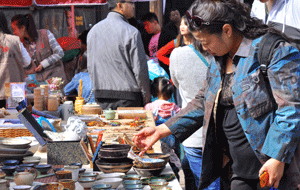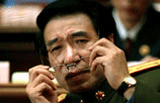'One country, Two systems' policy secures Macao's development
Updated: 2014-12-07 19:48
(Xinhua)
|
||||||||
MACAO -- Macao Chief Executive Chui Sai-on has pledged to give priority to comprehensively implementing the "One country, Two systems" policy and the Basic Law, which he said would be the top principle for his governance of Macao in the next five years.
"The achievements in Macao have highlighted the great vitality of the 'One country, Two systems' policy," Chui told Xinhua on the eve of the 15th anniversary of Macao's return to China.
Chui, 57, will be sworn in as the fourth-term chief executive of the Macao Special Administrative Region (SAR) on Dec. 20 after winning a reelection on Aug. 31.
"The past 15 years since Macao's return to the motherland is the fastest-growing period in Macao," he said, citing a rapidly developing economy, ever-improving livelihood, and a harmonious and stable society in the region.
The SAR's gross domestic product (GDP) reached 413.47 billion patacas (51.76 billion U.S. dollars) last year from 50.27 billion patacas in 1999, with an average annual growth of 16.2 percent. The GDP per capita jumped from 15,000 dollars in 1999 to 87,000 dollars in 2003, which ranks the second highest in Asia and fourth in the world.
Meanwhile, the unemployment rate has dropped from 6.3 percent upon Macao's return to China in 1999 to 1.7 percent. The average monthly income has tripled to 15,000 patacas from 4,920 patacas and the life expectancy of local citizens has risen from 80.7 years in 1999 to 85, the second longest in the world.
The chief executive attributed the rapid development in Macao to an accurate understanding and comprehensive implementation of the "One country, Two systems" policy, and the healthy development of relations between the central government and the Macao SAR.
"The Mainland is always a strong supporter for Macao, and I believe the backing will continue in the future," Chui said.
He appreciated the support from the central government and other provinces and autonomous regions to Macao, by such means as the Mainland and Macao Closer Economic Partnership Arrangement, the Guangdong-Macao cooperation framework agreement, and promotion of Macao as a world center for tourism and leisure envisaged in the central government's 12th five-year plan for socio-economic development, among others.
Chui believed that Macao can properly handle the relationship between "One country" and "Two systems" largely due to the local citizens' tradition and values of "loving the country and loving Macao."
"Most of the Macao people are fully aware that Macao is a special administrative region under China's sovereignty. The SAR's interests can be safeguarded only when the country's interests safeguarded," he said.
Over the past five years, Chui has been trying to diversify Macao's economy by lessening the SAR's heavy dependence on the casino gaming and developing other industries of cultural creativity, convention and exhibition, as well as tourism featuring hotels, food and restaurants, retailing and cultural heritage.
"The regional cooperation between Guangdong province, Hong Kong and Macao will be an opportunity for Macao to develop a diversified economy," he said.
The chief executive acknowledged that the shortage of land and human resources are the major challenges facing Macao.
However, a plan, approved by the central government in 2009 for the Macao SAR to reclaim 350 hectares of land from the sea, has been finalized, according to Chui. The land will be used for public housing rather than the gaming industry.
A talents development committee, chaired by Chui, was also established earlier this year to look for ways to increase the number of people undertaking tertiary education and fill gaps in the labor market.
Realizing his great responsibility as chief executive of the Macao SAR, Chui said, "We will join hands with various social communities to build a harmonious Macao that keeps stable development."
- Troops refuse to gamble with Macao's security
- China's State Council appoints senior Macao officials
- Macao reports economic contraction
- Photographic focus on Macao
- 15 years of macao through 100 camera lenses
- HK chief executive says ready to talk with anyone on electoral reform
- Former HK chief executive calls on students to end Occupy movement
- HK chief executive to attend APEC meeting
- Hong Kong Chief Executive calls for peace after clashes

 South China's 'little Africa'
South China's 'little Africa'
 Trending: Eiffel Tower replica in Hangzhou
Trending: Eiffel Tower replica in Hangzhou
 Detailed models made from rice and trash
Detailed models made from rice and trash
 China, South Africa sign economic pacts
China, South Africa sign economic pacts
 Across America over the week (Nov 28- Dec 4)
Across America over the week (Nov 28- Dec 4)
 US official praises China's role in counter-piracy
US official praises China's role in counter-piracy
 Film takes on Chinese stereotypes in US
Film takes on Chinese stereotypes in US
 World news pictures of the year 2014
World news pictures of the year 2014
Most Viewed
Editor's Picks

|

|

|

|

|

|
Today's Top News
Kid killed in SW China earthquake
China's stock market value surges
Zhou Yongkang expelled from CPC
China's tourism market to see 6b trips in 2020
China, South Africa sign economic pacts
Quake jolts southwest China again
China registers 92 million people in poverty
Zhou Yongkang arrested, put under judicial probe
US Weekly

|

|







